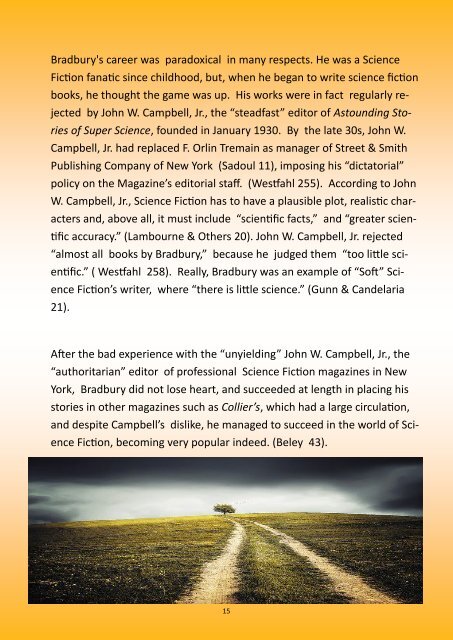Megalopolis
You also want an ePaper? Increase the reach of your titles
YUMPU automatically turns print PDFs into web optimized ePapers that Google loves.
Bradbury's career was paradoxical in many respects. He was a Science<br />
Fiction fanatic since childhood, but, when he began to write science fiction<br />
books, he thought the game was up. His works were in fact regularly rejected<br />
by John W. Campbell, Jr., the “steadfast” editor of Astounding Stories<br />
of Super Science, founded in January 1930. By the late 30s, John W.<br />
Campbell, Jr. had replaced F. Orlin Tremain as manager of Street & Smith<br />
Publishing Company of New York (Sadoul 11), imposing his “dictatorial”<br />
policy on the Magazine’s editorial staff. (Westfahl 255). According to John<br />
W. Campbell, Jr., Science Fiction has to have a plausible plot, realistic characters<br />
and, above all, it must include “scientific facts,” and “greater scientific<br />
accuracy.” (Lambourne & Others 20). John W. Campbell, Jr. rejected<br />
“almost all books by Bradbury,” because he judged them “too little scientific.”<br />
( Westfahl 258). Really, Bradbury was an example of “Soft” Science<br />
Fiction’s writer, where “there is little science.” (Gunn & Candelaria<br />
21).<br />
After the bad experience with the “unyielding” John W. Campbell, Jr., the<br />
“authoritarian” editor of professional Science Fiction magazines in New<br />
York, Bradbury did not lose heart, and succeeded at length in placing his<br />
stories in other magazines such as Collier’s, which had a large circulation,<br />
and despite Campbell’s dislike, he managed to succeed in the world of Science<br />
Fiction, becoming very popular indeed. (Beley 43).<br />
15








